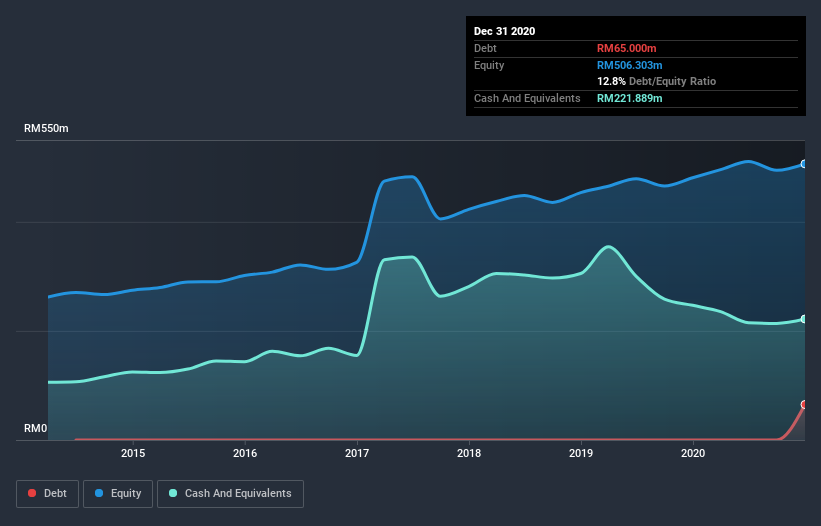
Legendary fund manager Li Lu (who Charlie Munger backed) once said, 'The biggest investment risk is not the volatility of prices, but whether you will suffer a permanent loss of capital.' It's only natural to consider a company's balance sheet when you examine how risky it is, since debt is often involved when a business collapses. We can see that Ajinomoto (Malaysia) Berhad (KLSE:AJI) does use debt in its business. But the real question is whether this debt is making the company risky.
When Is Debt A Problem?
Debt and other liabilities become risky for a business when it cannot easily fulfill those obligations, either with free cash flow or by raising capital at an attractive price. Part and parcel of capitalism is the process of 'creative destruction' where failed businesses are mercilessly liquidated by their bankers. While that is not too common, we often do see indebted companies permanently diluting shareholders because lenders force them to raise capital at a distressed price. Of course, plenty of companies use debt to fund growth, without any negative consequences. The first step when considering a company's debt levels is to consider its cash and debt together.
Check out our latest analysis for Ajinomoto (Malaysia) Berhad
What Is Ajinomoto (Malaysia) Berhad's Debt?
You can click the graphic below for the historical numbers, but it shows that as of December 2020 Ajinomoto (Malaysia) Berhad had RM65.0m of debt, an increase on none, over one year. But on the other hand it also has RM221.9m in cash, leading to a RM156.9m net cash position.

How Healthy Is Ajinomoto (Malaysia) Berhad's Balance Sheet?
According to the last reported balance sheet, Ajinomoto (Malaysia) Berhad had liabilities of RM54.7m due within 12 months, and liabilities of RM79.3m due beyond 12 months. Offsetting this, it had RM221.9m in cash and RM55.9m in receivables that were due within 12 months. So it actually has RM143.8m more liquid assets than total liabilities.
This surplus suggests that Ajinomoto (Malaysia) Berhad is using debt in a way that is appears to be both safe and conservative. Given it has easily adequate short term liquidity, we don't think it will have any issues with its lenders. Simply put, the fact that Ajinomoto (Malaysia) Berhad has more cash than debt is arguably a good indication that it can manage its debt safely.
And we also note warmly that Ajinomoto (Malaysia) Berhad grew its EBIT by 11% last year, making its debt load easier to handle. The balance sheet is clearly the area to focus on when you are analysing debt. But ultimately the future profitability of the business will decide if Ajinomoto (Malaysia) Berhad can strengthen its balance sheet over time. So if you're focused on the future you can check out this free report showing analyst profit forecasts.
But our final consideration is also important, because a company cannot pay debt with paper profits; it needs cold hard cash. Ajinomoto (Malaysia) Berhad may have net cash on the balance sheet, but it is still interesting to look at how well the business converts its earnings before interest and tax (EBIT) to free cash flow, because that will influence both its need for, and its capacity to manage debt. Considering the last three years, Ajinomoto (Malaysia) Berhad actually recorded a cash outflow, overall. Debt is usually more expensive, and almost always more risky in the hands of a company with negative free cash flow. Shareholders ought to hope for an improvement.
Summing up
While we empathize with investors who find debt concerning, you should keep in mind that Ajinomoto (Malaysia) Berhad has net cash of RM156.9m, as well as more liquid assets than liabilities. And it also grew its EBIT by 11% over the last year. So we don't have any problem with Ajinomoto (Malaysia) Berhad's use of debt. The balance sheet is clearly the area to focus on when you are analysing debt. But ultimately, every company can contain risks that exist outside of the balance sheet. We've identified 1 warning sign with Ajinomoto (Malaysia) Berhad , and understanding them should be part of your investment process.
At the end of the day, it's often better to focus on companies that are free from net debt. You can access our special list of such companies (all with a track record of profit growth). It's free.
When trading Ajinomoto (Malaysia) Berhad or any other investment, use the platform considered by many to be the Professional's Gateway to the Worlds Market, Interactive Brokers. You get the lowest-cost* trading on stocks, options, futures, forex, bonds and funds worldwide from a single integrated account. Promoted
New: Manage All Your Stock Portfolios in One Place
We've created the ultimate portfolio companion for stock investors, and it's free.
• Connect an unlimited number of Portfolios and see your total in one currency
• Be alerted to new Warning Signs or Risks via email or mobile
• Track the Fair Value of your stocks
This article by Simply Wall St is general in nature. It does not constitute a recommendation to buy or sell any stock, and does not take account of your objectives, or your financial situation. We aim to bring you long-term focused analysis driven by fundamental data. Note that our analysis may not factor in the latest price-sensitive company announcements or qualitative material. Simply Wall St has no position in any stocks mentioned.
*Interactive Brokers Rated Lowest Cost Broker by StockBrokers.com Annual Online Review 2020
Have feedback on this article? Concerned about the content? Get in touch with us directly. Alternatively, email editorial-team (at) simplywallst.com.
About KLSE:AJI
Ajinomoto (Malaysia) Berhad
Manufactures and sells monosodium glutamate and other related products in Malaysia.
Flawless balance sheet with solid track record and pays a dividend.
Similar Companies
Market Insights
Community Narratives



